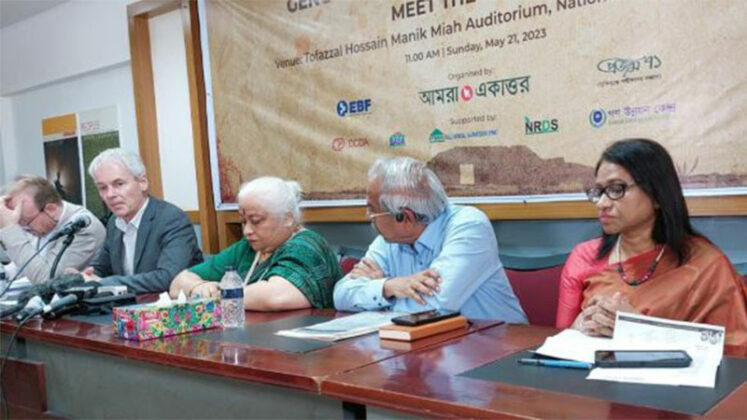In a major development, Netherlands is considering to recognize the role of Pakistan in 1971 Bangladesh Genocide. Notably, on May 21, a Dutch politician and former Member of the Parliament, Harry van Bommel, stated that the role of the Pakistan Army in committing in 1971 Bangladesh Genocide would get global recognition.
He is on a visit to Bangladesh from May 20-26, along with a European delegation, which will investigate the genocide committed by Pakistan in 1971.
This initiative was taken by the European Bangladesh Forum (EBF), which includes genocide scientist Anthonie Holslag (Vrije Universiteit), political analyst Chris Blackburn, British EBF chairman Ansar Ahmed Ullah and Dutch EBF chairman Bikash Chowdhury Barua. The EBF is a platform for the Bangladeshi diaspora in Europe.
The mission’s objective is to gather firsthand knowledge about the genocide carried out in Bangladesh by the Pakistani army during the Bangladesh Liberation War in 1971.
While speaking at a press conference at Jatiya press club in Dhaka, Harry van Bommel stated that the Bangladeshi Genocide will be recognised soon, “Even if it takes a hundred years to get global recognition of the Armenian Genocide, I hope it will not take that long in the case of the Bangladeshi Genocide. We want to have it within a few years, not even decades”.
This press conference was organised by Amra Ekattor, Projonmo Ekattor and EBF on the occasion of holding an international conference titled ‘International Conference on Bangladesh Genocide Recognition’ scheduled for May 22.
In the conference, Bommel stated that the Bangladeshi Genocide had not been acknowledged internationally even after 51 years of independence because of the cold war and the support Pakistan got from the global superpower, the United States, during that time period.
He said, “In 1971, the US extended their cooperation to Pakistan directly providing arms while India was with Russia at that time. That’s why the US has been pretending to know nothing about the genocide even though they have been well aware of everything” and added, “West’s friendship with Pakistan is the reason for this dilemma”.
Bommel talked about the relevancy of recognising the genocide “Dutch recognition of this genocide is relevant because in 1972 the Netherlands was one of the first countries to recognise the independence of Bangladesh.”
As per the official statement, the fact-finding team will deliver its findings to the Dutch government and the House of Representatives. According to the European Bangladesh Forum, a conference on the findings will also be held.
The genocide in Bangladesh is currently receiving attention worldwide.
Recently, two US Congressmen issued a resolution to the US House of Representatives urging President Joe Biden to acknowledge the crimes against humanity committed by the Pakistani military at the time. The legislation brought by Congressmen Ro Khanna, and Steve Chabot, recognise Pakistan’s atrocities against ethnic groups constitute crimes against humanity, war crimes, and genocide.
In the United Kingdom, too, recognition of the 1971 genocide has been discussed in parliament. The Member of Parliament, Sir Peter Shore, motioned to condemn the Pakistani atrocities during Bangladesh’s Liberation War in 1971. Later, 233 MPs placed another motion seeking to recognise the genocide.
Even US-based organisation Genocide Watch recognised the genocide and stated, “Genocide Watch recognises the crimes committed by the Military Forces of Pakistan against the Bengali population in Bangladesh in 1971 as genocide, crimes against humanity and war crimes”.
Bangladesh has often urged United Nations to recognise the Genocide of 1971. Last year, a representative from Bangladesh went to United Nations for recognition of the genocide but failed.
As per the Bangladesh government, around three million people were killed, over two hundred thousand women were raped, and 10 million people were compelled to cross the border into India in search of safety.




















Comments